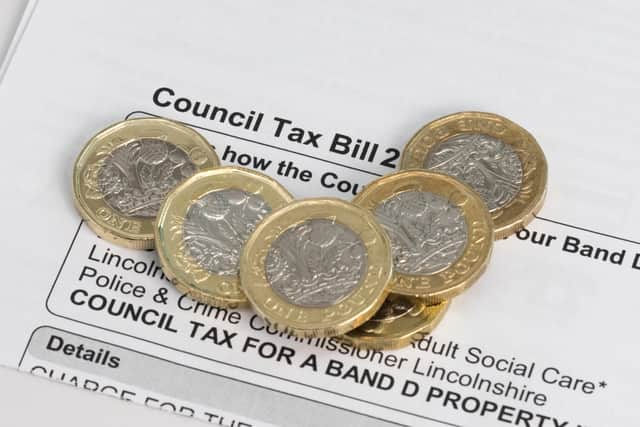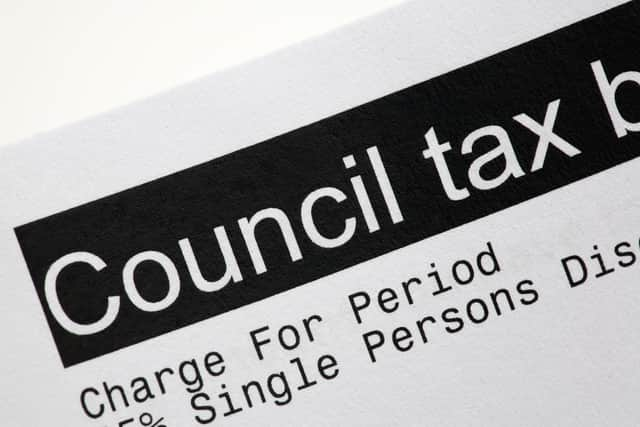Is council tax going up 2023/24? Planned increase explained, how much will bills rise, how to check my band
and live on Freeview channel 276
Council tax bills are set to be hiked by 5% in the majority of local authority areas in England this April, new research released today (14 February) has found.
It comes after Chancellor of the Exchequer Jeremy Hunt changed the rules councils have to abide by when they opt to hike taxes. He made the announcement in his Autumn Statement 2022.
Advertisement
Hide AdAdvertisement
Hide AdThe council tax increase will add further pressure to households already being squeezed by the cost of living crisis. Inflation has seen the price of everyday products and services soar, while interest rates have increased mortgage repayments.
There have been warnings the country faces a cliff-edge in April as a result of the government’s plan to make the energy price guarantee less generous. At the same time, increases to several utility bills, including water bills as well as mobile and broadband deals, are set to take place.
So will your council tax be hiked - and why could it go up by 5%? Here’s what you need to know.
Why is council tax rising?
In his Autumn Statement 2022 speech, delivered in November, Jeremy Hunt said he would allow councils to raise council tax by up to 5% from the 2023/24 financial year (1 April). It means a Band D property will pay around £100 extra a year on average.
Advertisement
Hide AdAdvertisement
Hide AdPreviously, councils had to hold a referendum if they wanted to increase council tax by more than 2% in any financial year. Councils with social care responsibilities could hike it by up to 3% without a vote. But now, all councils can hike bills by 3%, while councils with social care outlays can raise it by 5%.


This change only applies to councils in England. Local authorities in the other UK nations have their rules set by their respective devolved administrations.
The move was announced by Chancellor Hunt because councils across the country face major challenges with their budgets. Council tax is one income stream that councils use to pay for public services (like bin collections and libraries), with business rates and central government funding also major components.
But many councils are reeling from inflation and Covid pressures, as well as the impact of years of cuts to their funding from Whitehall - particularly during austerity. It has forced councils to cut back services, with some effectively going bankrupt over the last two years.
Advertisement
Hide AdAdvertisement
Hide AdThe UK government has said the amount councils will be able to spend next year will rise by £5.1bn - an average increase of 9%.
Where will council tax increase?
According to analysis of council budgets for 2023/24 by The County Councils Network (CCN) - a cross-party organisation representing England’s county local authorities - 84 councils out of 152 will raise council tax by the maximum permitted amount 4.99% on 1 April.
All bar one of the 114 councils it analysed (38 councils have yet to set out their budget proposals for the next financial year) were raising council taxes to some extent. Central Bedfordshire is the only council that is keeping its council tax frozen.
In three local authority areas - Croydon, Thurrock and Slough - council tax will rise by much more due to their financial difficulties. All three have effectively become bankrupt, with Croydon set to raise its rates by up to 15% and the other two able to hike theirs by up to 10%.


Advertisement
Hide AdAdvertisement
Hide AdWhen it announced councils could raise council tax by a higher amount without the need for a referendum, the government urged them to be mindful of the cost of living challenges faced by their residents. But CCN’s Labour vice-chairperson (and leader of Cheshire East Council) Sam Corcoran said local authorities had “little choice” but to hike rates.
“With inflation reaching levels not seen for over 40 years and with demand-led pressures for care services showing no sign of abating, local authority leaders are setting their budgets in the most difficult circumstances in decades,” Mr Corcoran said.
“We all recognise the cost-of-living crisis is impacting on every household in the country and disproportionally on low incomes, but we have little choice but to propose council tax rises again next year, with many local authorities reluctantly opting for maximum rises.
“With councils facing multi-million funding deficits next year, the alternative to council tax rises would be drastic cuts to frontline services at a time when people at the sharp end of the cost-of-living crisis need us to be there for them. With the financial situation for councils looking extremely tough for the next few years, we will be calling on the Chancellor for further help in the March Budget.”
Advertisement
Hide AdAdvertisement
Hide AdAround 95% of councils are expected to hike payments by the full 5% permitted, according to Treasury analysis published after the Autumn Statement in November.


How can I check which council tax band I’m in?
Council tax rates are different depending on where in the UK you live. If you live in England or Wales, you can check how much you have to pay by putting your address or postcode into this Government website.
For people in Scotland, you can do the same on the Scottish Assessors website. In Northern Ireland, council tax is referred to as ‘rates’ and is calculated in a different way. An explainer on Northern Ireland rates can be found on the devolved administration’s website.
What about in Scotland, Wales and Northern Ireland?
Council tax is set to go up all over the UK, although the changes vary from nation to nation.
Advertisement
Hide AdAdvertisement
Hide AdNo limit has been announced for council tax rises in Scotland and Wales, which means residents could be exposed to major increases to bills from April. In Northern Ireland, household rates are set to rise between 5% and 7.5% in the areas that have revealed their proposals.
To hear about the latest cost of living developments, as well as key personal finance news and tips, sign up to our Money Savers weekly newsletter by clicking through this link.
Comment Guidelines
National World encourages reader discussion on our stories. User feedback, insights and back-and-forth exchanges add a rich layer of context to reporting. Please review our Community Guidelines before commenting.
